#given that it isn't an individual sport anymore and he has to work in a team
Explore tagged Tumblr posts
Text
Valentino Rossi talking about the significance of number 9 in motorsports in regard to his 9 championships.
Via FIAWEC on Twitter 21.04.2024
#old man stays up at night thinking of what he lost#has to keep doing endurance racing because he can't stay away from the life of the racing track and can't imagine not winning#fascinating how he interacts with the endurance racing peers#given that it isn't an individual sport anymore and he has to work in a team#I remember in Fernando's prime docu series he spoke about how he was more collaborative with his teammates#and would frequently give them valuable input about the correct racing lines to take#anyway I want Vale to win WEC soon#I still want my old man winning#valentino rossi#vale#wec#endurance racing#motogp
17 notes
·
View notes
Text
How Touya can be Saved
I’ve talked before about why I think Shouto will save Touya, and now I want to talk about how. No doubt saving the eldest Todoroki child will be a combined family effort, but I want to specifically talk about Shouto’s role in this because it will be the culmination of his character arc. I also want to tie in how Dabi can make himself seen and understood by crying tears of blood in front of his family. Finally receiving validation after desperately needing it his entire life will be the key to his salvation.
As of chapter 298, Shouto already empathizes with Touya; he feels Touya’s hate and even recognizes Dabi is the person Shouto himself was before the Sports Festival. Shouto is extending his empathy and understanding to his brother the same way he reacted to Iida during the Stain arc in chapter 53, “Todoroki to Iida.”
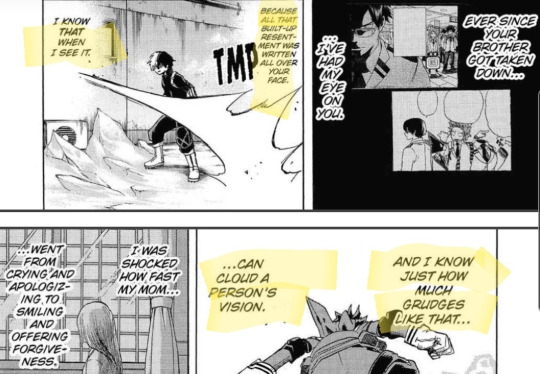
Having empathy for Dabi’s resentment is only the first step in reaching him, though. That shared rage doesn’t completely validate Dabi’s pain as an abuse victim, which is something Shouto has yet to recognize about himself. Shouto’s anger has always been about how Endeavor abused Rei to the point she had to be institutionalized and not how Endeavor isolated him, physically abused him, and robbed him of his childhood. Shouto probably hadn’t stopped to think about how the other Todorokis perceived their family situation because, like most families in this situation, no one talked about the abuse - Shouto even expresses surprise and agreement in 192 when Natsuo confronts Endeavor with the entire family’s pain. Shouto thinks back to the memory of wanting to play with his siblings and realizes that specific day didn't only stay with him but that his siblings remember it and were impacted by it, too.
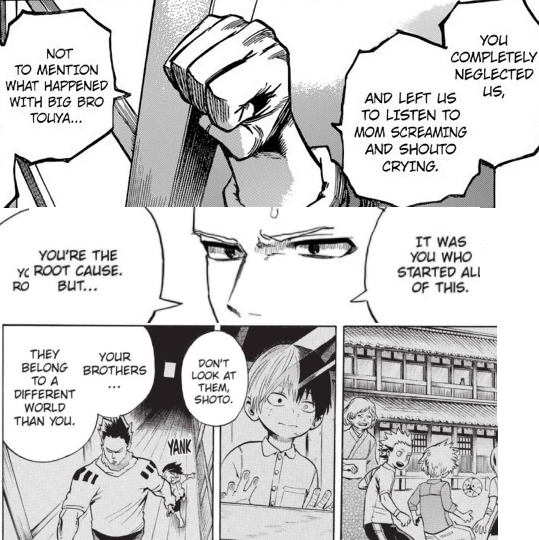
Like Natsuo, Dabi knows the root cause of their family’s dysfunction was Endeavor, and while he had a problem with what he perceived as each individual member’s blindness to their abuse, he ultimately doesn’t blame the victims and instead assigns all the blame onto Endeavor. Even 10 years later, he still calls Rei ‘okaasan’, Fuyumi ‘Fuyumi-chan’, and Natsuo ‘Natsu-kun’ because he still cares about them and recognizes all of them as victims of a corrupt hero who never set out to be a husband and a father and only used them.
However, Touya's own victimhood has never been validated - in 301 and 302, it was seen that he was the scapegoat for his family, and no matter how much he tried to earn back his father’s approval or call his father out on his unfair treatment, no one was ever on Touya’s side. His mother told him to look away from his father as an example instead of standing up to Endeavor for herself and her children, and Fuyumi and Natsuo were too young to understand and couldn't relate to what Touya went through as Endeavor's prized heir. Touya needs validation that he was abused and neglected. He always has. He still does.
The person in the perfect position to understand what it’s like to be on the receiving end of Endeavor’s impossibly high standards, obsession with surpassing All Might, and quirk training is Shouto. But in order to fully empathize with Dabi and show his brother that he can relate, Shouto needs to acknowledge that he too was a victim. In 292, Dabi basically asks Shouto to validate the pain and suffering Dabi had just exposed in the battlefield, but his question still stands unanswered.
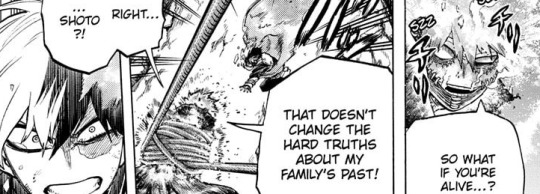
To reach Touya, Shouto also has to show Dabi what kind of person he is - as in, Shouto has to separate himself from Endeavor’s shadow and establish that he too has been holding Endeavor accountable for his actions. We as readers know that Shouto’s entire character arc has been about asking himself, “Who am I?” Often, children who grow up in abusive households struggle with their identity and Shouto is a perfect example of this. This is why he chose his hero name to be his name: Shouto. He’s learning who he is after years of trying so hard to not be his father and becoming exactly like him - cold, distant, tunnel visioned, hateful. It wasn't until he met Inasa that he realized this and wanted to right his wrongs.
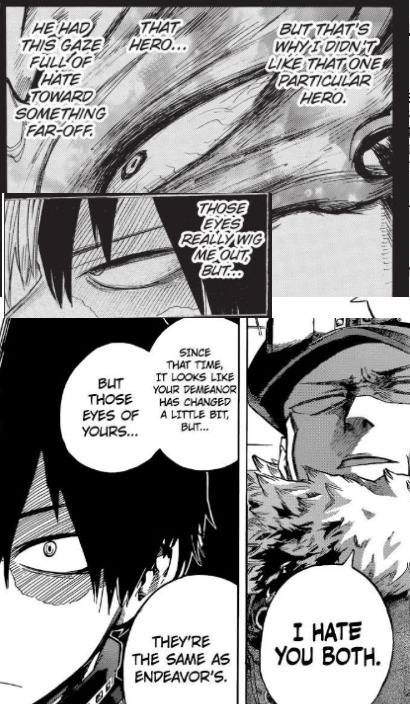
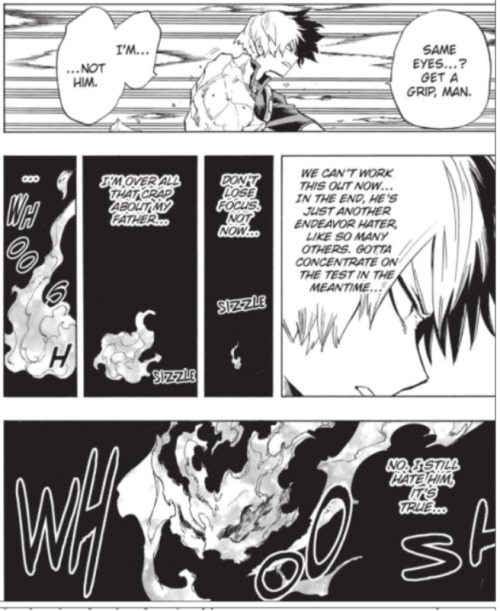
Like Inasa, Dabi doesn’t know Shouto at all. Both Inasa and Dabi knew Endeavor and assumed Shouto would be just like him. Inasa had a valid reason to think this of Shouto of course, because Shouto was standoffish and dismissive during the UA entrance exams, but at the time of the provisional license exam Inasa hadn’t learned that Shouto had recognized this toxic side of himself and had begun working towards the kind of person he wants to be. Shouto had to show Inasa the real him, and in a similar way, he will have to prove this to Dabi. Dabi hasn’t seen Shouto struggle with his identity like we the readers have; Dabi only sees his usurper making headlines and willingly interning with Endeavor. He probably assumes Shouto is proudly training to carry their father’s legacy. Dabi isn’t privy to the nuanced relationship Shouto or their siblings have with their father. All Dabi knows is that Endeavor is seeing and paying attention to Shouto and Shouto seemingly submitting. Dabi has no idea THIS is how it really is:
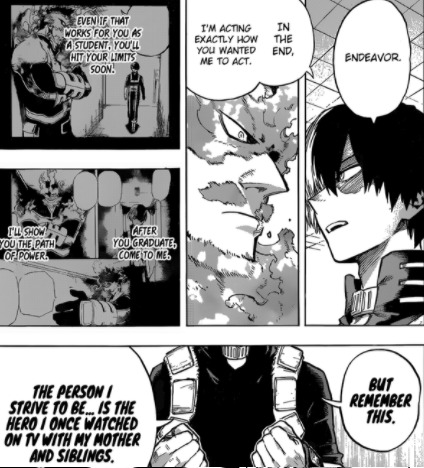
Showing others who he is is a way for Shouto to process his own trauma and establish his identity. As the son of the #2 hero, Shouto has always had to prove himself to others - that he’s not his father. He’s even had to prove this to himself by accepting his fire side and making it his own in spite of his father repeatedly calling him a creation or a masterpiece. Not being like his father is such a defining trait for Shouto that he feels compelled to tell kindergarteners during the re-licensing exam his life story and his trauma. He literally bore his heart out to these kids because he knew he wouldn’t get through to them unless he was genuine. I think he’ll apply this concept to Touya, too.
The thing about Shouto is that, while he hasn’t reconciled with his own status as an abuse victim, he sees himself as a survivor. He sees himself as someone who managed through a difficult situation and wants to help others get through their struggles too. That's why getting through to these kids was so important to him, why he took it so seriously. These were problematic kids, and instead of calling them brats or trying to intimidate or manipulate them, he tries to get down to their level and relate. Notice he emphasizes how much he struggled in school at first, how his relationship with his father is strained - in his mind, it's something these kids may be able to relate to.

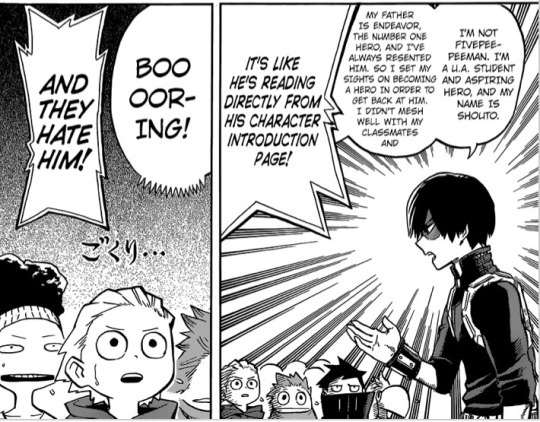
Shouto is someone who sets out to understand and make others feel seen and understood. It's what makes him kind. Shouto probably understands why his father abused the entire family - Endeavor's reasons don't excuse him or earn his children's forgiveness, but it's a reason that humanizes him to Shouto. He himself was a cold, bitter person who now believes people can change if given the right opportunity and self-awareness because this is a lesson he's learned from Midoriya and Inasa. This is also something Shouto can grant Touya: understanding, a listening ear, space to be wrong, and a chance to be seen.
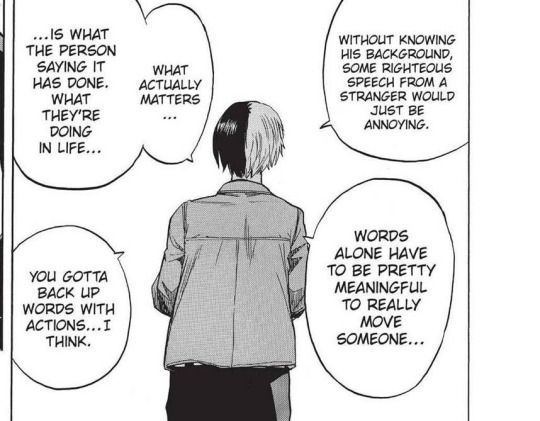
Touya wanted and still craves to be seen, and he has to see in return. He has to realize Shouto isn't his father's puppet. He has to relate to Shouto much like Shouto is relating to him. Shouto will have to pull the same move he pulled on those kindergarteners and tell Dabi his struggles, and then show him he’s making his own path different from their father’s and that the family isn’t blindly following Endeavor anymore or letting him do what he wants. Natsuo has stood up to him, Rei has stood up to him, Fuyumi has admitted to herself she had been trying to play a happy family instead of fixing the internal mess - they as a family will have to show Dabi all of this, and he’ll have to wrap his head around it. He has to realize that his family is different from how they were 10 years ago. This is what I mean by allowing Touya space to be wrong - it’s okay for him to be wrong in assuming all these things about Shouto. Shouto won’t judge him for it.
I've talked before about how the narrative framing as of chapter 309 has set up that a person must express their feelings in a socially acceptable manner before they can be a candidate for saving, and that means crying. As soon as Midoriya saw a glimpse of little Tenko crying, he switched his mentality from "I'll never forgive you" to "I want to save that crying boy." When Toga ran away from Ochako crying, Ochako became concerned and curious. Following this pattern, it makes sense that Dabi also has to show his emotions, but it’s complicated because he can’t cry due to his burnt tear ducts. Every time we’ve seen him cry tears of blood, he’s been alone - he’ll have to cry in front of Shouto and the family for it to sink in that all of Dabi’s destruction and hate stems from deep-seated sorrow and feelings of abandonment. The family does not yet know how the fire that killed Touya started, and they have no idea that Touya’s emotions are linked to his fire and that he died because he was feeling overwhelmingly forsaken and sad. Once they find out, however, they’ll fully understand Touya (hopefully) and recognize they haven’t been understanding him at all. Saving Touya will be difficult because he has to be vulnerable and that's not something he's done as Dabi, but that's where the Todoroki family arc is headed: healing as a family.
As a side note: I’m not saying that the message the manga is giving is the correct one (how you express yourself shouldn’t be a determinant of the help you receive) but it’s what we have to work with. I also think saving Touya will be more complicated than this and will also involve Natsuo, but that’s a meta for another day! ;]
#bnha#dabi#touya todoroki#shouto todoroki#my meta#inasa yoarashi#bnha spoilers#Bnha meta#Mha#mha spoilers
405 notes
·
View notes
Text
MORE ADHD VIKTOR HEADCANNONS!
Hey Friends! So one of the most beautiful parts of Yuri on Ice is how Yuuri’s anxiety is depicted, right? It’s a really interesting detail, which makes him a much more complex, 3-dimensional character – which in turn gives the story more emotional stakes, and makes the viewers want to root for him.
Another lovely thing about it, is that lot of viewers who have Anxiety in real life found a character that they could relate to – a strong, wonderful, precious character who achieves great things, despite his mental health issues.
SO, keeping that in mind, I’d like to share a long-held head cannon of mine (though I certainly wasn't the first to think of it) about another beloved YOI Character.
Since October is ADHD Awareness Month, I present for your consideration: ADHD Viktor!

(Based on my personal, real-life knowledge and experiences managing my own ADHD)
ENJOY! (it’s a VERY long post, sorry not sorry, lol)
- Viktor has Combined Inattentive/Hyperactive Type ADHD.
[According to the DSM-5 (The Diagnostic and Statistical Manual of Mental Disorders, 5th Edition, *which is the most recent edition, published in 2013) ADHD is broken down into three sub-types: Hyperactive Type, Combined Inattentive/Hyperactive Type and *Inattentive Type (*Previously referred to as “ADD” – or Attention Deficit Disorder without Hyperactivity).]
- He’s never been FORMALLY diagnosed though, because OBVIOUSLY talented/“gifted”/successful people can’t POSSIBLY have an Executive Functioning Disorder/Neurodevelopmental Disorder.
[*SARCASM*]
- When he was a little kid (like 4 or 5) he had SO MUCH ENERGY. TOO MUCH ENERGY. ALL THE ENERGY ALL THE TIME. He was ALWAYS talking too much and “getting into trouble” – his constant outbursts were nearly impossible for the adults in his life to handle. So, his parents/guardians enrolled him in various sports, hoping to channel some of that energy into something “more productive”.
[Hello, Hyperactive Symptoms!]
- That’s when he FELL IN LOVE with skating – it was all he ever wanted to do, all he ever wanted to think about, all he ever wanted to talk about, all he ever cared about.
[Ahh, yes, there’s that typical ADHD fixation/obsession]
- And he was good – INCREDIBLY GOOD. So he kept going; He kept getting better and better, and eventually got into Jr. Competitions, where he started winning. And then . . . he kept winning. Suddenly, everyone (especially adults) started praising him for his “dedication” and “focus” – he wasn't constantly being reprimanded for his behaviour anymore; he wasn't being told to “sit still” and “stop fidgeting” anymore.
[People with ADHD often tend to develop a very low self-esteem, because, as children, they are constantly being scolded for their behaviour (Behaviour which they cannot control, because their brains are literally wired differently).]
- But, the praise and attention was only a tiny piece of the puzzle. What REALLY mattered to Viktor was that he had found something he loved, and he was GOOD at it. He finally felt like he belonged somewhere; completely at home on the ice.
[Subconsciously, skating may have given Viktor an incredible creative outlet (People with ADHD tend to be “creative types”), while the exercise during practice may have given him an awesome boost of serotonin, endorphins and DOPAMINE (The leading theory is that ADHD is linked to/caused by an imbalance/lack of dopamine – that’s why stimulant medications can sometimes help. Exercise is also a highly encouraged lifestyle management tool for those with ADHD).]
- So, Viktor kept skating because he loved it, because he excelled at it, and soon he was the Junior World Champion. Things still weren't perfect though – Yakov always yelled at him for spacing out during practice, getting distracted during interviews, forgetting things all over the place, constantly being late (or outright forgetting commitments altogether) and just generally showing a lack of interest/care in anything that didn't involve him physically skating.
[There you are, Inattentive Symptoms; welcome to the party!]
- But like . . . it isn't Viktor’s fault that interviews are so boring. And, besides, Yakov always took care of the scheduling and stuff – if something important came up, Yakov would just remind him!
[People with undiagnosed ADHD tend to subconsciously develop their own “coping” mechanisms to counteract their symptoms – like perfectionism, avoidance, excessive procrastination, or dependency on others.]
- As an adult, Viktor made a name for himself as a figure skating LEGEND. So . . . If he was late sometimes, or distracted, or overly-emotional, it’s totally FINE – LEGENDS like himself are ALLOWED to be ECCENTRIC.
[ADHD can often go unrecognised/undiagnosed/misdiagnosed well into adulthood – especially in “gifted” individuals. ADHD symptoms are also often overlooked, as it can present comorbid with other conditions such as Depression, Anxiety, OCD, ASD (Including Aspergers Syndrome), Tourette’s, Dyslexia, Oppositional Defiant Disorder, and Conduct Disorder (just to name a few).]
- But now, Viktor’s reaching the end of his career – he’s a 5 time World Champion and . . . nothing is as easy as it once was. He has no more inspiration. He can’t surprise the audience anymore. He’s still winning . . . but it isn't fun anymore. It doesn't make him happy anymore.
[Maybe it’s because no one is good enough to challenge him, so competitions aren't interesting anymore. Or maybe it’s because he’s lonely, with no time for Life or Love . . . but part of the boredom/malaise could ALSO be the lack of DOPAMINE taking its toll. DOPAMINE is responsible for regulating the “reward centre” of the brain – people with ADHD might not feel the same “rush” as others when they achieve things – like getting good grades, being promoted or receiving an award].
- AND THEN comes the infamous banquet – where Viktor meets Katsuki Yuuri, HIS FUTURE HUSBAND AND THE LOVE OF HIS LIFE. Now, Viktor LOVES skating . . . but he can’t remember EVER being happier than when he was dancing with Yuuri. And sure, he’s had lovers before, but NOTHING ever felt like THIS. He is 100%, absolutely, irrevocably, unquestionably IN LOVE. IT’S ALL SO NEW AND EXCITING AND SCARY AND WONDERFUL AND YUURI IS PERFECT AND VIKTOR IS FEELING ALL THE THINGS!!!
[Another symptom of ADHD (and many other psychiatric conditions) is “Emotional Dysregulation” – people with ADHD can find it hard to control their emotions, often have rapidly shifting emotions, feel their emotions INCREDIBLY INTENSELY, and then tend to act on them impulsively. They often view problems/life in “black and white”; It’s pretty much “all or nothing” feelings-wise.]
- One thing leads to another, and suddenly Viktor has dropped EVERYTHING to fly to JAPAN to be Yuuri’s coach on a WHIM because he is overjoyed and excited and in love – AND THERE’S NO WAY THIS COULD POSSIBLY BACKFIRE! THIS IS THE BEST DECISION HE’S EVER MADE EVER.
[There’s that classic ADHD impulsivity/recklessness/risk-taking.]
- He expects Yuuri to be overjoyed to see him – they’re going to skate and talk and have “slumber parties” and fall in love! But . . . that doesn't happen. Not right away, in any case. Instead, Viktor shows up and Yuuri runs away – he doesn't want to have slumber parties and he starts avoiding him and he acts like he doesn't even REMEMBER the banquet! It’s like Yuuri isn't happy to see him at all. So, Viktor may have been a bit teary-eyed, as he went to sleep ALONE (apart from Makkachin) that first night in Hasetsu.
[Some people with ADHD also experience something called Rejection Sensitive Dysphoria (RSD) – an extreme emotional sensitivity to PERCEIVED rejection/criticism].
- Viktor and Yuuri slowly become closer over time; working on their relationships (both personal and coach/student) and figuring out how to communicate . . . even though Viktor has a tendency to be too blunt/push too hard/be too clingy at times.
[EPISODE 2]
VIKTOR: So, do you have feelings for Minako? Do you have a lover now? What about ex-lovers?
YUURI: I’d rather not talk about it . . .
VIKTOR: Then let’s talk about me! Let’s see, my first –
[EPISODE 3]
VIKTOR: The truth is, you’re actually both FAR MORE mediocre than you think. You need to be more self-aware.
[EPISODE 4]
VIKTOR: Yuuri! Why don’t we get some food?
Yuuri! Want to soak in the springs together?
Yuuri! How about a slumber party?
[EPISODE 5]
VIKTOR: It’s amazing you got such a high score after running your face into a wall, but thanks for proving me right about your ability to get a solid PCS! And don’t worry about letting me down, I know you’ll do better next time!”
[EPISODE 7]
VIKTOR: I'm not very good with people crying
Skater’s hearts are as fragile as glass – let’s try shattering his into pieces . . .
[People with ADHD tend to have communication issues. They might not easily pick up on the emotions of others, interrupt often or otherwise steam-roll conversations. They commonly tend to talk too much, talk too loudly, speak before they think, or say incredibly blunt/hurtful things (all without even realizing what they are doing), which can make them come across as callous, self-centred or tactless. Impatience can also be a HUGE problem – they may tend to dive into new things head-first and don’t always take the time to properly assess situations/build relationships. People with ADHD are often described as being “intense”/“overbearing” or having “BIG PERSONALITIES”; opposingly, they might also be perceived as “flaky”/“aloof”/“uncaring”(depending on ADHD Type and Symptoms Exhibited).]
- Eventually, things start heading in the right direction. Viktor is a fully-fledged coach, and Yuuri just keeps getting better; constantly growing and surprising him. Coaching is exciting for Viktor, because it’s new and novel and he gets to be with Yuuri – but it’s also exhausting, because now it’s HIS job to take care of all the scheduling/organizing/memorizing/time management – things that Yakov used to do. Things that definitely DON’T play to his own strengths.
[EPISODE 2]
VIKTOR: Uh, oh, that’s not a happy face. Let me guess, I forgot to do something I said I would do?
[EPISODE 2]
VIKTOR: Ha, ha, ha, yea, I remember now, it totally slipped my mind! I'm sorry, but you know how I forget stuff sometimes . . .
[EPISODE 5]
YUURI: I must have told you a million times – but in last year’s nationals I BOMBED EVERYTHING . . .
[EPISODE 5]
YUURI: Do you have any idea where Viktor is? It’s about to start and I can’t find him!
VIKTOR: Sorry, were you waiting?
[EPISODE 6]
YUURI: Come on, Viktor! We’ll miss the flight if we don’t get moving!
[EPISODE 6]
VIKTOR: I'm hungry and this is boring, can we go get hot pot now?
YUURI: I'm kinda in the middle of an interview here . . .
[EPISODE 10]
VIKTOR: Do you want to try my hot wine?
YUURI: No, I don’t like to drink before a competition
VIKTOR: Oh, right, I forgot.
There are other little quirks of Viktor’s coaching too; but maybe that’s just because it’s all so new to him. He doesn't have the most experience – but he DEFINITELY has the most enthusiasm.
Like, THAT KISS - (you know the one ;) )
[Pretty impulsive, wouldn't you say? (In the BEST WAY, of course :D)]
And whenever Viktor is rink-side, watching Yuuri skate; he’s always SUPER animated – he gets so invested he even does the quad flip along with Yuuri at the Grand Prix Final in Barcelona!
[EXCITEMENT - INTENSE EMOTIONS! HIGH ENERGY/RESTLESSNESS – SOMETIMES IT JUST GETS EXPRESSED AS A QUAD-FLIP!]
Viktor also gets super into the other Skater’s short programs at the Grand Prix Final, and doesn't notice how his words/actions are affecting Yuuri.
[Perhaps it’s just because he loves skating and misses it so much . . . or could it be attributed, in part, to his ADHD brain fixating without him realizing it?]
[So, to sum up; forgetfulness/memory issues, tardiness/poor time management, easily bored/distractable, impulsive . . . those are all pretty much par for the course with ADHD (and other Executive Functioning Disorders as well).]
- In the end, Yuuri wins silver at the Grand Prix Final; but more importantly, he gives Viktor two very important things: Life and Love. And while the road to the GPF is rough and rocky, (managing both Yuuri’s Anxiety and Viktor’s ADHD); their love only grows, changing them and challenging them . . . and making them BOTH stronger for it.
So, there you have it; my ADHD!Viktor head cannons! :)
He may be forgetful and flaky and blunt and pushy and impulsive and emotional – but he’s also energetic and outgoing and supportive and talented and creative and brilliant and charming and loving.
I see a lot of myself in Viktor – good things and bad things – so this head cannon has a very special place in my heart. Almost all our ADHD-related stories/characters in pop-culture are inaccurate, disregard the realities of ADHD, or just blatantly depict it COMPLETELY WRONG – so when I saw these traits more accurately mirrored in Viktor, a character that I love with all my heart, I couldn't help but expand on the idea.
Having said that, ADHD is a complex disorder; here are some basics:
- ADHD is an Executive Functioning Disorder/Neurodevelopmental Disorder.
- The name: “Attention Deficit Hyperactivity Disorder” is a bit of a misnomer; it’s not a “lack” of attention, so much as it is the brain’s inability to filter out stimuli, and direct “focus” where it needs to be at any given time.
- According to the DSM-5, there are 3 subtypes of ADHD – Inattentive, Hyperactive and Combined Inattentive/Hyperactive.
- Not everyone with ADHD will present ALL Symptoms of ADHD, due to the different subtypes.
[There are also many more common Symptoms/Comorbidities that go along with ADHD, which I did NOT head cannon for Viktor – things like Sensory Perception Issues/Misophpnia, Coordination Issues/Dyspraxia, and Low Frustration Tolerance/Hot Temper, just to name a few]
- ADHD is GENETIC and HERITABLE – and is linked to a lack of Dopamine.
- ADHD is not a “Childhood Disorder”. It’s not something you “grow out of” or “cure” – it’s something you learn to manage and live with. Medication is one option – but treatment may also include making lifestyle changes (like diet, exercise, and getting proper sleep), working with ADHD coaches, going to Therapy, and investing time in creating an organizational system that works WITH one’s symptoms.
- An ADHD diagnosis does not mean that one is stupid or lazy or out of control – plenty of highly intelligent, “gifted” or otherwise successful individuals have ADHD (and in fact, with the right diagnosis and treatments, many people who struggle or “under-perform” at school/work due to ADHD are able to harness their previously untapped potential, leading to great improvements in their work, and enabling them to start on a path to success).
- ADHD isn't a “fake illness” or an “excuse”. ADHD is a very REAL disorder, with a very REAL impact on the lives of those that it affects. However, with the proper diagnosis, knowledge, skills and tools, ADHD is also manageable – and you can absolutely learn how to work WITH your ADHD to become your best self.
***
So, if you've stuck with me this long, thanks for reading! I hope you've enjoyed these little head-cannons for one of my most favourite characters of all-time – and maybe learned something new that can help you or a loved one living with ADHD.
Thanks again! This has been my contribution for ADHD Awareness Month and the YOI One-Year Anniversary!
See You Next Level! ;)
#Yuri on ice#yuuri on ice#yuri!!! on ice#yuuri!!! on ice#yuri on ice headcannon#viktor nikiforov#victor nikiforov#adhd viktor#adhd awareness#adhd awareness month
25 notes
·
View notes